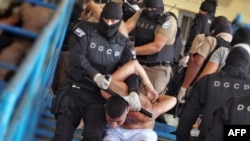El Salvador was until recently infamous for its gang-related violence. In 2015, the most violent year due to gang violence since the turn of the century, El Salvador registered 105 homicides per 100,000 inhabitants. Over the next six years the numbers steadily declined, reaching a record low in the first two months of 2022. But everything changed in March. In the span of three days between March 25 and March 27, 87 Salvadorans were murdered. Salvadoran President Nayib Bukele blamed the killings on street gangs which use violence to extract “protection taxes” from neighborhoods they control as well as for political leverage over elected governments.
March 27 was a Sunday. Nonetheless, that morning President Bukele called in the legislature and declared a State of Emergency. Soldiers set up roadblocks in some neighborhoods and, as of April 14, rounded up and arrested some 10,000 men, women and children for suspicion of being gang members or associated with these criminal groups.
The state of emergency allows the government to suspend some constitutional rights, including extending the time allowed for pretrial detention and immediate access to a defense attorney, due process, and freedom of assembly. Roughly a week later, on April 5, the Salvadoran legislature passed a vaguely worded law severely restricting freedom of the press: anything that could be interpreted as reproduction or dissemination of messages from gangs is now punishable with 10 to 15 years in prison.
“The United States government is concerned about violence in El Salvador and the passage and implementation of the April 5 Criminal Code amendment by the Legislative Assembly criminalizing reporting on certain gang activities,” said Secretary of State Antony Blinken in a written statement. “The law lends itself to attempts to censor the media, prevent reporting on corruption and other matters of public interest, and silence critics of the Salvadoran government. Journalists must have the freedom to do their jobs without fear of violence, threats, or unjust detention,” he said.
“We continue to support El Salvador in its efforts to reduce the proliferation of gangs. Since 2008, we have invested 411 million dollars to improve citizen security and help the Salvadoran government combat gang violence,” said Secretary Blinken.
“We urge El Salvador to address this threat while also protecting vital civil liberties, including freedom of the press, due process, and freedom of speech.”
Curbing Violence at Expense of Civil Liberties in El Salvador

The U.S. is concerned about violence in El Salvador and the implementation of the April 5 Criminal Code amendment by the Legislative Assembly criminalizing reporting on certain gang activities.





